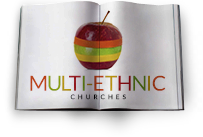Pastor’s Forum: Can You Reverse-Engineer a Multi-Ethnic Church?
Editor’s note: We asked three pastors this question: Can you manufacture a multi-ethnic church programmatically, pragmatically, or consumeristically? In other words, is there a way to reverse engineer one?
*****
No, I don’t think you can, anymore than you can duct-tape apples to an oak tree and call it an apple tree. The growth and development of bonds of love between people of different ethnicities has to grow naturally and organically. That’s the only way those bonds will be strong enough to hold through the strains and difficulties that naturally arise in church life. Let me mention a few reasons why you can’t “reverse-engineer” those bonds.
First, everyone knows how to spot phony. If you try to force multi-ethnicity in your church just by singing a few culturally different songs now and again, or hiring one or two people that look different from the majority of your church, the people you’re trying to reach will probably appreciate the effort at some level, but they’re not going to feel “at home,” and therefore they’re not likely going to settle at your church. The truth is, people feel most at home where it doesn’t require obvious effort to make them feel “at home.” Home is where you don’t stand around waiting to be invited to take a seat; you just flop down on the couch. It just fits; it just is.
Second, bonds created around a reverse-engineered culture, by their nature, simply aren’t going to be very strong. That’s not true only in the context of multi-ethnicity, either. Many churches have learned the hard way over the years that if the only or primary reason people are coming together is for a shared musical taste, or a shared love for a certain preacher, or even for a shared “church culture,” that makes for fragile bonds. Change the music a little bit, let the pastor resign for some reason, put a little pressure on the culture, and you see really quickly that the church wasn’t gathered because they love each other and Jesus; they were there because they loved something else. What you want, instead, is a church that gathers primarily because they love each other and Jesus, and therefore they’d keep gathering even if the “look” of things changed pretty dramatically.
Third, there’s wisdom in the saying, “What you win them with, you win them to.” If your church exists because of a certain kind of music or a certain ethnicity of staff member, then at root you’re creating a church whose love and attraction are centered on those kinds of things rather than on Jesus. If you win them with sugar, they’re going to love and pursue sugar. If you win them with Jesus and the Word, they’re going to pursue Jesus and the Word.
So if you don’t build a multi-ethnic church through reverse engineering, how do you do it? Two things: First, remove obstacles. If your church is doing things that are inherently offensive, insensitive, or off-putting, stop doing them. It’s really that simple. Second, and more importantly, do the things that Christians do. Preach, sing, talk about Jesus, pray, and love. Those aren’t White, Black, Latino, Eskimo, Arab, or Asian things to do—they’re Christian things, and Christians—regardless of their ethnicity—will be drawn to them. That may be a slow process, yes, but it’s one that brings people to one heart with each other, not just into one room.
—Greg Gilbert is the senior pastor of Third Avenue Baptist Church in Louisville, Kentucky. You can find him on Twitter at @greggilbert.
*****
First, I don’t claim to be an expert on multi-ethnicity. My experience is limited to the Pentecostal church that I grew up in (which was extremely diverse with a predominantly white staff), the last church I served in (Blueprint Church), and the church I presently pastor (Cornerstone Church), both of which are in Atlanta. Plus, I have a number of conflicting thoughts on the topic. I hope as I share mine, it doesn’t come off as if I’m seeking to invalidate the opinions of others, who, like me, are really just sharing their convictions based on past experiences.
I tend to think of the ethnicities that compromise my or any church in the same way I think of the number of people in a church. When we walk about numbers, we realize that the size of our churches are determined by many factors—the quality of the preaching, the friendliness of the congregation, space, quality of the children’s ministry, systems that are in place to shepherd the church and handle growth, and so many other spiritual dynamics. Most fundamentally, however, we know the size of a church depends upon the sovereignty of God.
That means, if a pastor of a 100-member church asks a pastor of a 1000-member church how to make his church grow, the pastor of the 1000-member church should know to be very cautious and not over-promise: “If you do what I did, you, too, will have 1000 members!” The pastor of the 1000-member church might offer helpful principles. But both pastors should know that, even if the pastor of the smaller church executes those principles flawlessly, his church may never grow beyond 100. And if he does not get the results he hopes for, it doesn’t necessarily mean that he is doing something wrong. It may just means that God intends for him to pastor a church of 1,000 members. It is no indictment on his faithfulness as a pastor or their faithfulness as a church.
I tend to see diversity in the same light. So many factors impact a church’s ethnic diversity—location of the church, history of ethnic relations in the city, the plethora of healthy churches led by qualified and gifted men of all races in different denominations that people in a particular city can choose from (which is something that wasn’t present in Ephesus or Galatia as Paul was writing those letters).
Some “rules” for multi-ethnicity seem broadly true. For instance, if the lead pastor belongs to the majority culture, it is less likely the church will be diverse, unless his staff is diverse.
But those rules are not always true. My present and last church have been extremely diverse and multi-ethnic, but they became that way with elders who were only young African-American men. It has been things like this that have made me realize that it’s pretty hard to prescribe objective principles to grow a diverse church, because the most diverse churches I’ve been a part of have broken some of the most basic and cardinal rules.
Not to mention, so many other churches did so much more to be multi-ethnic than we did, and they didn’t achieve the results that they hoped for. Again, it’s not that they were doing anything wrong; it’s simply that there are many factors at play, most significantly, God’s sovereignty. Even if you do everything “right” by the conventional wisdom of the day, no results are guaranteed.
So to answer the question: Can you manufacture a multi-ethnic church programmatically, pragmatically, or consumeristically?
I think that you can reverse engineer a multi-ethnic church about like you can reverse engineer a mega-church. As I look at Scripture, I think it’s our responsibility to ensure that we are tearing down any walls that would leave people thinking they have to adopt any particular cultural form in order to adopt the gospel. However, as far as results are concerned, I think those are up to God and shouldn’t be something that creates discontentment in a pastor who is doing all he can to remain faithful.
What I’m not saying is that there is nothing that you can do to contribute to seeing diversity grow in your church. There are many other guys with lots of footnotes and research that can provide helpful pieces of advice and best practices. Just know that those best practices don’t guarantee a thing. Be faithful, get honest critique about what your church is like and how you may have unnecessarily clothed the gospel in your own cultural garb, and do all you can to remove those stumbling blocks. And then, rest in the fact that God will make your church what he means for it to be.
—John Onwuchekwa is the lead pastor of Cornerstone Church in Atlanta, Georgia. You can find him on Twitter at @JawnO.
*****
Whenever it comes to some aspect of church ministry, we must always begin with the Romans 4:3 question: “What does the scripture say?” We must align that topic with the Bible to be sure that it is actually part of a God-honoring, eternally fruitful church.
Having determined that it is, we are then free to findout from other churches what practical wisdom they can give us as local church leaders that will help us be more faithful in that area. Ministries like 9Marks thrive in both aspects: showing biblically what are aspects of healthy church life, and giving practical insights from many local church settings that may or may not be immediately applicable in your situation. So there is no aspect of biblical ministry that can be manufactured programmatically, pragmatically, or consumeristically. But if the Lord has revealed in scripture that something should be part of a fruitful local church, we can have good confidence that the power of his Holy Spirit will be there to cause it to flourish in its own unique way in every setting on earth.
Concerning multi-ethnic church life, the elders at FBC have determined from the Bible that it is greatly glorifying to God and powerfully effective for the spread of the gospel of Jesus Christ for our church membership to reveal a “surprising unity” to our surrounding community. The phrase “surprising unity” refers to a unity in Christ that defies cultural and historical norms and can only be explained by the power of the gospel in the lives of individuals. We believe that when two groups of people in a community are usually bitterly at odds with each other, and when in a local church in that community, individuals from each of those factions clearly love each other deeply from the heart, the gospel will spread much more powerfully in that community. I first saw it in John 17:23 where Jesus prays that the people who believe in him through the word of the apostles will be “brought to complete unity to let the world that you sent me, and have loved them even as you have loved me.” This work of ever-increasing unity between sinners can only be achieved by the gospel, by justification followed by increasing sanctification. As that happens, more and more people will know that Christ is God and will find life in his name.
We have found this to be both extremely desirable and remarkably difficult. In our setting (the American South), there is a long heritage of bitter racism that is not easily overcome. We regularly seek out ministry ideas for outreach and church life from other healthy, multi-ethnic churches. We filter what they do through our own gift-set and community setting. So we do not seek to “reverse engineer” but rather be inspired by God’s unique activities in other settings. This is how the universal Body of Christ can best aid one another in growing toward an ideal of heaven-like unity here on earth.
—Andy Davis is the pastor of First Baptist Church in Durham, North Carolina.










